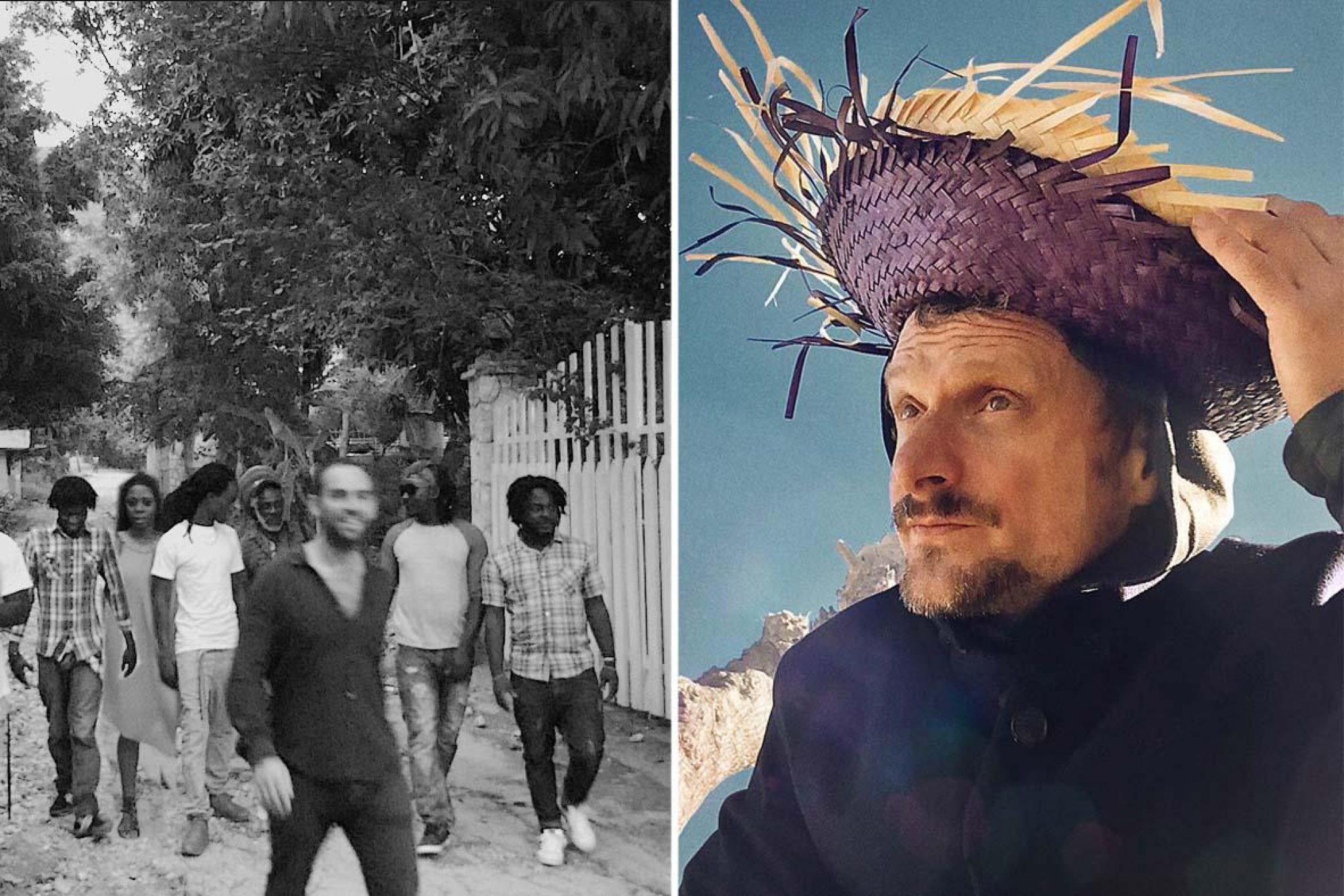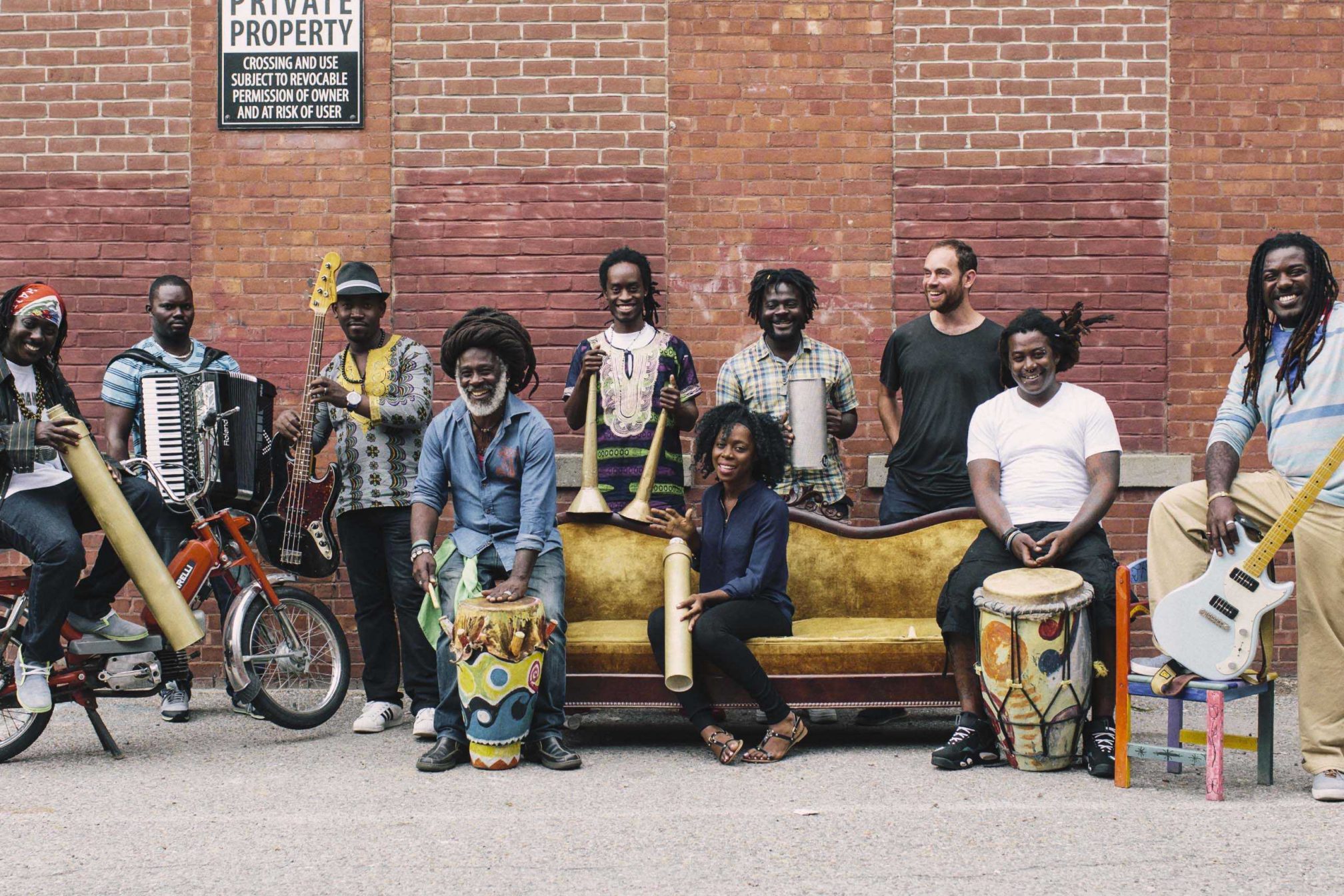 Features
Features
"It's ecstatic": DJ Koze, Lakou Mizik & Joseph Ray on the power of Haitian Vodou music
DJ Koze, Lakou Mizik's Steeve Valcourt and Nero's Joseph Ray discuss Haitian musical spirituality and the parallels between Vodou ceremonies and nightclubs
Drum patterns dripping in sunshine and synths that make your heart sing — this is the true make-up of a DJ Koze remix. It's been two long years since the visionary German producer's last foray into the form, and even longer since he turned his attention to reworking music outside of his own label, Pampa Records.
For his Anjunadeep debut, Koze is taking his signature style to a sound he's never explored before: Haitian Vodou music, a ritualistic dance music born on the Caribbean island and deeply embedded into its spirituality and ceremonial practices.
The genre, which combines drumming, singing and dancing, developed alongside Haiti's Vodou religion and the merging of West and Central African religions with Christianity. It is a source of pride for Haitians and can be credited with inspiring multiple nearby genres such as Trinidad's shango and obeayisne in Jamaica. In the US, the closely related "Voodoo" music was seen as a way to bind the diasporic community, to cope with their harsh treatment at the hands of Europeans in the early South - and can be seen in early forms of the blues.
For modern Haitians, though there is a massive influx of music and influence from their neighbours in the Caribbean, the US and Latin America, it's not unusual to find both young and older people gathering for traditional Vodou drum ceremonies, with the music of their ancestors still a key part of national life.
Read this next: DJ Koze: the magic loop
Haitian music collective Lakou Mizik encapsulate this perfectly, having been on the scene since the 1980s the multigenerational musical movement use traditional chants and prayers, combined with Ra-Ra festival music and modern electronic composition to present a contemporary vision of Haitian music.
For their latest album 'Leave the Bones', Lakou Mizik teamed up with GRAMMY-winning electronic musician Joseph Ray, one-third of seminal British trio NERO, to create an evocative musical offering that combines traditional Vodou elements with Ray's electronic expertise.
DJ Koze has remixed the first track from the record 'Sanba Yo Pran Pale' - a song Lakou Mizik describe as a tribute to "the poets and keepers of Haitian culture" - and eimagined it as a summer dance track, warping vocals from Lakou Mizik founding member Sanba Zao through rhythmic synths and warm, enveloping bass.
We caught up with DJ Koze, Joseph Ray and Steeve Valcourt of Lakou Mizik to talk about the parallels between Vodou ceremonies and nightclubs, talking to spirits, and using music to bridge language barriers.
DJ Koze, when did you first hear the 'Sanba Yo Pran Pale'? And Joseph and Steeve, how was it to hand over the track to Koze to be remixed?
Koze: I loved this song from the first time I heard it earlier this year. When I was young I followed everything written and shown about the astronauts from Mercury to Apollo and still follow them. They are my idols, these brave souls. This song makes me think of them. I know it has nothing to do with it at all.
Joseph: I'm a big Koze fan so it was very exciting to hear he was into the project and wanted to do a remix. We didn't even have to send him the stems... he whipped it up in no time and, obviously because it's DJ Koze, came up with something magic.
Steeve: You know the remix process is still a mystery to me. When we think back to the original – this totally a capella prayer that we often sing out to start our shows – we are calling out to ancestors and the “lwa” or spirits: it is the poets/artists communing. What I like is that no matter what form it takes – it’s still sending a message out to those ready to receive it. It’s beautiful
Read this next: NERO's Joseph Ray responds to Trump's remarks on Haiti
How do you think your musical backgrounds compare? Have you found a connection with each other through music?
Koze: Music brings people together. This is magic. The more it happens to you, the more you watch out for it. It is there all the time. Like-minded people. Many times you will nod and pass like ships in the night. Other times it is the start of precious musical cooperation. It crosses cultural boundaries, and it is not necessary to speak the same language. In my ignorance, I feel a desire to trust such connections.
Joseph: We all have pretty different backgrounds but as Koze says, music crosses any boundaries like that. Hopefully one day, post-COVID, we'll all be able to meet in person!
Steeve: Music for us is... well everything. I don’t think there’s an exact comparison to how Haitians feel when certain songs or even instruments like the Vodou tanbour (congas) or Rara Kòne are played. It’s pride and patriotism and something so deep it is hard to explain. But what is beautiful is that it is our music that allows us to communicate and collaborate with people around the world. Even though we speak a language that only Haitians understand, that music bridges everything that could divide us.
Tell us a little about Vodou music Steeve, what are the traditions that surround it?
Steeve: Every ritual in Vodou has a song or rhythm or dance that goes with it. Every spirit has their own songs and dances. Music and rhythm is at the heart of Vodou and so it is at the heart of everything in Haiti. It is like air or water or your favorite spice that flavors everything. Whether they know it or not, every Haitian listens to and sings with Vodou rhythms – in church or at the beach with the troubadours, almost all of our popular music is based on it one way or another. What people don’t understand is how deeply Vodou is beliefs, practices, mythology is integrated into Haitian daily life. They say there are over 300 rhythms in Haiti; they all are attached to Vodou practices.

Koze, Joseph and Steeve, what made you want to reimagine a Vodou track into a summer dancefloor track? Are there parallels between dance music and this more traditional genre?
Koze: Dance is an integral part of the Vodou ritual ceremony. I imagined how I would love to dance to these poems, I love to build Trojan horses and challenge the crowd with new, unheard signals hidden behind accessible rhythms.
Joseph: There are definitely parallels - Vodou ceremonies go on for hours, usually into the early hours, and it's all about dancing together and getting to a place beyond your day-to-day self.
Steeve: People always feel so scared when they hear about Vodou spirits taking over people's bodies at ceremonies. For me, I don’t see a difference between that and what happens to people at concerts or clubs – it's something ecstatic and one culture may see it as the Christian “holy spirit” and another might see it as “losing yourself in music”. For us, we attribute it to our spiritual beliefs, but I think the essence is the same – so for me personally I don’t think it’s strange or wrong.
How important is nostalgia in all of your musical outputs?
Koze: There's a famous quote from Thomas Morus [Thomas More]: "Tradition is not the worship of ashes, but the passing on of the flame".
Joseph: Although these are old songs, I feel like the project wasn't actually too nostalgic. It was in part about bringing a new sound to them and also showing them to a new audience.
Steeve: For Haitians, our history is something lived daily. For many Haitians, daily life is hard to bear and the future is hard to imagine, but our proud past – the home of the first successful slave revolution – is very present. So I think the idea of nostalgia is very different for us. We know what we are living through, we know how people often view Haiti and like to say we are “the poorest country in the Western hemisphere”, but the message of Lakou Mizik from the beginning is that we refuse to be defined that way. We look back to help instil pride in our people and remind people around the world who we are – but we also look forward, embrace new ideas and want to be a part of Haiti’s change and movement out of these difficult times. We are just musicians, but musicians are like journalists and we want to start writing a new story for the country.
Read this next: These artists travel the world to create next-level sounds
What have you discovered about the music of Haiti, Joseph? When did you first visit? What inspired you so much?
Joseph: I first visited around 2015 and met the band at a music school I did a bit of teaching at; Steeve is a full-time teacher there. Lakou were playing at a nearby beach spot so I went and watched them and loved it. Vodou is alive there and if you're walking around at night sometimes you'll hear ceremonies going on. I and a friend went along one night and hearing those songs inspired me to try to take them and cross them with my sound.
Steeve, how important is music like this to introducing people to Haitian culture and music?
Steeve: Honestly I think that music is the absolute best way to introduce people to a new side of Haiti. We love this project with Joseph and all the remixes so much because it opens people's ears and minds to our culture and when their ears and minds are opened... their hearts will follow. When people hear these songs, even if filtered through Joseph or DJ Koze, they are making a positive connection with Haiti. Before this, they may have only known about the earthquake or the political instability, the president assassination or the poverty – but now they have another point of connection and this one makes them feel good and it opens up a possibility for empathy and connection. This is our mission and with this project and the remixes, it has been amplified 100 times.
Tell us about the process of creating this track?
DJ Koze: I was channelling [Lakou Mizik and Joseph Ray's] raw creativity, it was one of the most satisfying experiences ever.
Joseph: This is a capella prayer that Lakou Mizik sings so all I really had to do was record it, and then add a few melodic parts and embellishments underneath.
Steeve: The legendary Sanba Zao – the oldest member of our group and a true original legend of Haitian roots music — wrote this song in the ’80s from what we know. We use it as a prayer but when he wrote it in the middle of the Duvalier period, it was more than that — it was a protest, it was a call to action. The “Sanbas” are poets and the song says that the poets will be telling the Vodou spirits what is happening. During this period all messages had to be hidden — but this is almost like a threat to be careful what you do because the Sanba poets and musicians speak directly to the spirits. All of us in Lakou Mizik have learned so much from Sanba Zao.
Lakou Mizik & Joseph Ray 'Sanba Yo Pran Pale (DJ Koze remix)' is out now, you can stream + buy here
Megan Townsend is Mixmag's Deputy Digital Editor, follow her on Twitter


